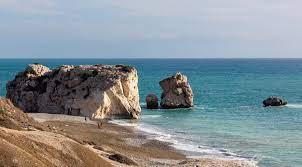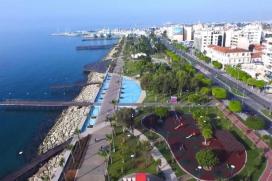Reducing the impacts of tourism seasonality in the small island state of Cyprus
Reducing the impacts of tourism seasonality in the small island state of Cyprus
Zanete Garanti
City Unity College Nicosia, Nicosia, Cyprus and
Faculty of Economics and Social Development,
Latvia University of Life Sciences and Technologies, Jelgava, Latvia, and
Tourism seasonality’s impact in Cyprus
501
Received 17 July 2022 Revised 17 July 2022 Accepted 17 July 2022
Abstract
Galina Berjozkina
City Unity College Nicosia, Nicosia, Cyprus
Purpose – This concluding article aims to summarize the key points and outcomes from the theme issue question: How could the Republic of Cyprus reduce the impact of seasonal tourism on long-term sustainable development? Which is a follow-up issue to the Cyprus sustainability theme issue published in Worldwide Hospitality and Tourism Themes volume 13 number 6 2021.
Design/methodology/approach – The paper summarizes the findings of the theme issue in relation to how stakeholders in the Republic of Cyprus can reduce the impact of severe tourism seasonality on long-term sustainable tourism development.
Findings – The findings of the articles in this theme issue explore the depth of the seasonality problem and its impact on the long-term sustainability of the small island state of Cyprus. Further, the articles in this collection explore potential remedies and ways to mitigate seasonality with the help of alternative, special interest tourism activities, improved air connectivity, established cluster-based activities, and improved accessibility to the island.
Originality/value – The articles in this issue provide perspectives from academics, practitioners, industry professionals, and policymakers on what steps could be taken to tackle increasing tourism seasonality that has profound effects on economic, social, and environmental sustainability in the island of Cyprus.
Keywords Seasonality, Small island state, Cyprus, Tourism, Sustainability Paper type Viewpoint
Overview
For decades Cyprus has been known for sun and sea holidays; however, policymakers, industry professionals and practitioners have known for a long time that depending on one type of tourism activity creates seasonal fluctuations that make the island’s tourism vulnerable to economic, social, and environmental challenges. In this theme issue, seasonality implications and opportunities to mitigate the effects of tourism seasonality are discussed from multiple perspectives, involving diverse types of stakeholders.
This issue opened with two in-depth literature review papers. First, in the article Tourism seasonality: the causes and effects written by Anda Zvaigzne, Lienite Litavniece, and Iveta Dembovska, the authors explore the concept of tourism seasonality and discuss the causes of fluctuations in tourism activity. They conclude that seasonality has natural, institutional, and economic causes and that seasonality has both positive and negative impacts. Some seasonality is necessary, especially for ecological reasons; however, depending on the level of seasonality, it can create economic, employment, infrastructure, and other challenges, especially when destinations depend heavily on tourism activity.
In the literature review article Climate change and tourism: A paradigm for enhancing tourism resilience in SIDS, Bharti Gupta, Sarath Pedapalli and Prachi Mahajan explore the impact of climate change on further fluctuations in tourism activity, causing more issues with
Worldwide Hospitality and Tourism Themes Vol. 14 No. 5, 2022 pp. 501-504 © Emerald Publishing Limited 1755-4217 DOI 10.1108/WHATT-07-2022-0085
WHATT 14,5
502
seasonality and sustainability. Yet, natural disasters caused by climate change are unavoidable in the future and so the authors propose a framework for increasing tourism resilience in SIDS that includes planning actions in the initial stage, mitigation in the pre- disaster phase, restoration in the post-disaster stage, and resilience actions in long-term strategic plans.
Next are several data review and analysis articles beginning with Tourism seasonality in small island developing states: evidence from Cyprus by Galina Berjozkina which explores the severity of tourism seasonality in Cyprus by reviewing relevant data. The author concludes that Cyprus’ destination image of sea and sun has been dominant for years, and is the major factor in decisions about holidaying in Cyprus. This causes short periods of high tourism, followed by low seasons that impact on economic stability and create unemployment. The author also discusses measures taken by stakeholders to extend the Cyprus tourism season. These could include re-shaping the Cyprus brand image to incorporate Cyprus as a winter destination and expanding rural, niche, active and other types of tourism.
In the article: Alternative and special interest tourism to mitigate the effects of tourism seasonality: the debate from Cyprus, Zanete Garanti provides a systematic review of the literature on Cyprus’ public and private sector efforts to expand alternative forms of tourism. It is concluded that there are decade-long efforts to offer alternative and special interest tourism products; however, these efforts have failed mainly due to the public sector’s ‘top-down’ approach and inability to involve local communities in decision- making, and supply and demand side issues. Nevertheless, National Tourism Strategy 2030 defines a new approach to mitigating seasonality and aims to develop Cyprus as an all-year-round destination. Significant effort, investments and incentives have been made to develop health and wellness, gastronomy, cultural, religious, casino, rural, sport, and special event tourism. Further to this, the Deputy Ministry of Tourism in Cyprus seems determined to adopt innovative approaches to achieving its strategic aim; however, the success of these incentives will depend on the collaboration of public and private sector stakeholders.
The theme issue continues with articles based on the outcomes of interaction between academics, practitioners, policymakers, and industry leaders. Several approaches were taken by the writing team to gather diverse perspectives from the field: structured and unstructured interviews, questionnaires, focus groups, attending a conference, and field visits. The purpose was to interact with stakeholders at multiple levels and in some depth in order to gather the diverse perspectives that are contained in the following articles. The first is the article: Mitigating seasonality in tourism by attracting young travellers: evidence from Cyprus by Sotiroula Liasidou, Galina Berjozkina and Kosmas Pipyros. This article explores the importance of attracting young people to visit Cyprus as it is a fast-growing market segment, characterized by travelers who are adept at using technology. Here is argued that destinations should plan on implementing supportive technology in the pre, during, and post-journey phases, and become “smart tourism destinations” to enhance their appeal to young travelers. To facilitate this study the authors conducted a focus group discussion with young travelers, concluding that social media and blogs are a key source of information for Millennials, who are also actively involved in content creation and electronic word of mouth communication by giving and receiving feedback. The study participants expressed the need for interactive, virtual reality, and digitized tourism products and services. As the market share of young travelers is growing year-on-year and this group passes on their technological skills to their own children, it is evident that destinations like Cyprus must plan now its strategy to enable the island to be digitally present and appealing to this market segment.
Next, the article Air transportation and tourism interactions and actions for competitive destinations: the case of Cyprus by Sotiroula Liasidou, Zanete Garanti, and Kosmas
Pipyros explores the integration of the airline industry and air transportation with overall tourism policy. This study was conducted with the help of self-administered questionnaires with stakeholders, followed by unstructured interviews with the selected respondents. The authors conclude that Cyprus air connectivity has a profound impact on tourism development, as the island is accessed almost exclusively by air. And while there is an elaborated tourism strategy and policy in place, coordination at the local level needs significant improvement. Moreover, despite the significant role that the airline industry and air connectivity play in overall tourism development, respondents indicated that current networks of destinations only partially satisfy the demand and there is a lack of a long-term systematic approach to airline industry development and integration in overall tourism strategy. Cooperation and coordination among airlines, airports and other stakeholders is also an area for improvement. Interestingly, respondents indicated the need for an airline association and after in-depth interviews with stakeholders, it was concluded that such an association could potentially bring many benefits. The process to establish Air Transportation and Tourism Society Cyprus has been initiated and the authors of the paper are actively involved in helping to establish the association with 200 members by the end of 2022.
The article A sustainable destination is an accessible destination: examining the relationship as a remedy to seasonality by Sotiroula Liasidou, Kassandra Fella, and Christiana Stylianou explores the various aspects of accessibility to Cyprus as a destination for people with disabilities. Given that around 15% of the global population has some sort of disability, the market for accessible tourism is large and growing. Here the authors argue that to achieve sustainable tourism development and mitigate the effects of seasonality, destinations must ensure that people with disabilities have access to tourism resources. In this study, the authors conducted semi-structured interviews with stakeholders in accessible tourism. They concluded that the development of accessible tourism can bring many potential benefits to Cyprus; however, the market has not yet been explored. The respondents indicate that the current tourism policy in Cyprus does not focus on accessible tourism and the majority of cities and attractions are not easily accessible. As accessibility is a fundamental and integrated component of sustainability it should be embedded in strategic planning and the overall tourism policy.
In the final article Opening the path of gastro tourism cluster development: the case of Cyprus by Zanete Garanti and Christiana Stylianou, stakeholders’ perspectives and dimensions of a gastro tourism cluster are explored. Food is becoming an increasingly important part of the visitors’ journey to a destination, and an integral part of the destination’s image. However, one restaurant or one traditional dish cannot build an experience, rather, it is the collaborative effort of all stakeholders who work together to build the complete experience and image. The article is a result of stakeholder interactions during a Gastro-Tourism Conference as well as unstructured follow-up interviews. The authors propose a cluster approach to gastro tourism development in Cyprus, building a collaborative platform of stakeholders that could collectively help to facilitate better individual business competitiveness and innovation and create unique visitor experiences. A gastro tourism cluster consists of gastro-enterprises that co-cooperate (and also compete while cooperating) and build collaborative ties in order to benefit from the synergies created. This initiative also requires and array of other supportive enterprises and industries that share a vision for creating unique and memorable experiences for visitors. For example, hotels, transport companies, educational and research institutions and public sector institutions all have the resources and influence to kick start cluster development. One significant condition of the cluster is geographical proximity, meaning that all cluster members have to be located in close proximity to each other in order to
Tourism seasonality’s impact in Cyprus
503
WHATT 14,5
experience the synergies and participate in idea and knowledge sharing that can foster innovation and knowledge transfer within the cluster.
Concluding notes
This theme issue represents a concerted effort to systematically review and discuss the work
undertaken to-date by public and private sector stakeholders in Cyprus to reduce the impact 504 of seasonality on the long-term sustainability of the destination. The issue outcomes are based on the collaborative work of a dynamic writing team that explored the seasonality problem from multiple perspectives, using new approaches and methods. During the preceding theme issue launch in 2021 on the sustainable development of Cyprus (volume 14 number 6), event participants concluded that the main obstacle to sustainable tourism development in Cyprus is its over-dependence on sun and sea tourism which is characterized by a short season of high tourist arrivals, overcrowding, and over tourism, followed by low season with little tourism during the winter months. This creates instability and vulnerability for tourism enterprises and leads to economic, social, and environmental challenges. In response, this theme issue presents the perspectives of academics, practitioners, industry leaders and professionals and public sector representatives on approaches and remedies to
tourism seasonality and in our view, solutions can be implemented. Now is the time to act!
Corresponding author
Zanete Garanti can be contacted at: z.garanti@cityu.ac.cy
For instructions on how to order reprints of this article, please visit our website:
www.emeraldgrouppublishing.com/licensing/reprints.htm
Or contact us for further details: permissions@emeraldinsight.com








There are no comments yet
Leave a Comment